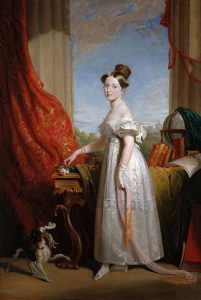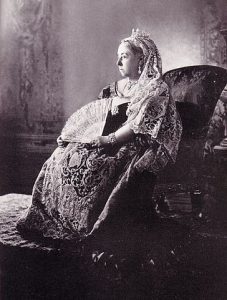A Year in Review: 1819
In the history book in my brain, 1819 is dominated by the Peterloo Massacre.

England suffered a severe depression at the end of the the Napoleonic war, as a result of the transition to a peacetime economy. The sudden drop in government spending and the loss of wartime markets for British grain and manufactured goods led to falling prices, unstable currency, and widespread unemployment.
Members of Parliament reacted in their own self-interest as landowners and passed protective tariffs on grain as a way of solving the country’s economic problems. The new Corn Laws protected landowners’ incomes, but meant urban laborers had to pay a higher price for bread when times were already hard. (1)
Workers reacted with strikes and bread riots across England. (2) Members of working class societies called public meetings, in which they called for the repeal of the Corn Laws and parliamentary reform. Instead of taking actions which would have negatively affected the wealth and power of individual members of Parliament, in 1817 the government attempted to stifle the reform-societies by making public meetings illegal, suppressing all societies not licensed by the government, and suspending the Habeas Corpus Act, so that prisoners could be held without trial.
These measures brought a temporary lull in popular demonstrations, but did nothing to solve the underlying problems. In 1819, reformers once again held mass meetings in the larger industrial cities, one of which resulted in the Peterloo Massacre on August 16 1819. An estimated 60,000 workers gathered on St. Peter’s Field in Manchester to hear radical orator Henry Hunt. Fearful that a large group of reformers would turn into a large group of rioters, the local magistrate ordered a squadron of cavalry to charge through the crowd to arrest Hunt. As massacres go, the immediate damages were small: eleven people dead and roughly 700 people injured.(3) The fear generated in the ruling classes was huge.
The government moved quickly to deter further demonstrations. Hunt and eight other organizers of the Manchester meeting were arrested and Parliament passed the Six Acts: a series of repressive laws intended to eliminate unauthorized public meetings, suppress the radical press, and make it easier to convict popular meetings.
Obviously the Peterloo Massacre wasn’t the only thing of importance that happened in 1819. Maybe it wasn’t even the most important thing. Here are some other high points, low points, and things that caught my imagination:
- The princely states of the German confederation had their own concerns about radical movements. Universities, student groups, and gymnastics associations had become hotbeds of liberal and nationalist sentiment inspired by the French Revolution —not the kind of thing that made nineteenth century monarchs happy. When a slightly crazy student named Karl Sand assassinated the conservative playwright August von Kotzebue, the ministers of the major German states used it as an excuse to crack down. The result was a hard-nosed policy agreed on by a consortium of German states called the Carlsbad decrees, which prohibit political meetings, imposed censorship of the press, outlawed student fraternities and gymnastics associations, and gave universities the right to remove any professor who taught “subversive” doctrines. The immediate effect was to shut down political and nationalist expression in German. Or at least to send it underground.
- The Cotton Mills and Factories Act of 1819 made it illegal for factory owners in Great Britain to employ children under the age of nine. Children between the ages of nine and fifteen were limited to a twelve hour work day. The passage of the act has been tied to the Peterloo Massacre, but in fact the first version of the act was drafted in 1815.(4)
- The British founded Singapore as a free-trade port. Previously the Dutch East India Company had held a trading monopoly in the region. Allowing unregulated free-trade in the new port, change the economic dynamics in the region.
- The United States acquired Florida from Spain in exchange for assuming some five million dollars in claims against the Spanish government by United States citizens.
- European and American companies began industrial scale-whaling in the Pacific islands. The availability of a cheap source of oil made the second wave of the industrial revolution possible (5) and made cities safer through the use of whale oil lamps on city streets(6). These changes occurred at the cost of the massacre of whale populations.
- The publication of Jakob Grimm’s German Grammar and Horace Wilson’s Sanskrit-English Dictionary, both of them blockbusters in the field of linguistics. Yes, blockbusters. Linguistics was one of the most exciting academic subjects of the day, with a popular intelligent audience akin to archaeology or astronomy today. It both pushed the boundaries of human knowledge and fed the fervor of romantic nationalism. (Which I swear I will write a blog post about one of these days.)
Oh yes, one last thing. The future Queen Victoria was born on May 24.
(1) Apparently they hadn’t learned anything from the French Revolution.
(2) Never a good sign. Bread riots have been a warning flag for potential revolution from ancient China through the Arab Spring.
(3) Compared, say, to the Amritsar Massacre a hundred years later, when a stupid order by a British general result in 400 deaths and 1000 people injured in a peaceful gathering of 10,000.
(4) I’m going to resist the temptation to make comments here about change and legislation and leave you to draw your own conclusions.
(5) The short version: machinery needs to be oiled
(6) At least in “good” neighborhoods


Another factor: 1816 was the year without summer. Crops failed in much of Europe. https://en.wikipedia.org/wiki/Year_Without_a_Summer
A good reminder. Thank you!